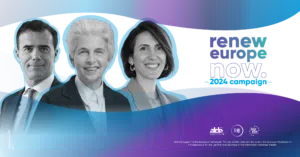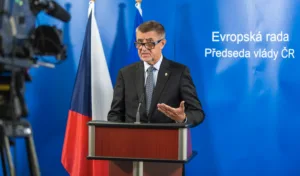Brussels If it is not a showdown, it will be close. The Renew Europe liberals are approaching a vote that threatens to put them with their backs to the wall in the European Parliament in the next legislature, not only because of the risk of a beating at the polls but, above all, because of the moment of internal reflection as early as June 10 on the behavior of the national member parties. Between those who spontaneously leave the movement and others expelled due to alliances with the far right – rejected at the European level but cleared through customs already in three member countries – the day after the European elections promises to be fiery inside the new European Liberal Group.
All attention will inevitably turn to what is happening in the Netherlands, where the liberals of the People’s Party for Freedom and Democracy (VVD) gave the green light to a government with the far-right, anti-immigration, anti-Islamic, and strongly Euroskeptic PVV (Party for Freedom). “It is a big mistake if, at the national level, we start a dialogue with the extreme right,” Sandro Gozi, the Secretary General of the European Democratic Party and (one of the three common candidates for the Renew Europe Now campaign, had made clear during the Eurovision Debate 2024 at the EU Parliament among the Spitzenkandidaten. Gozi had made it known that the issue of the possible expulsion of the PVV from the Renew Europe group “will be discussed on June 10 as the first item on the agenda” after the European elections, “then we will decide democratically, and it won’t take years like the EPP on Viktor Orbán or the PES on Robert Fico.”

It should be recalled that European liberals took a very clear position on the issue of alliances in Brussels and the 27 capitals as early as the campaign launch. Moreover, at the beginning of May, the leaders of Renew Europe, the Progressive Alliance of Socialists and Democrats (S&D), the Greens/ALE, and the Left signed a joint statement in which they pledged not to enter into coalitions with the extreme right “at any level.” The decision was reiterated without nuance by Gozi on the fact that the future of a shift of alliances to the right will depend on the intentions of liberals: “I don’t understand how the EPP is willing to cooperate with Vox, Meloni, and the ECR, who want to dismantle Europe from within. The closer the EPP gets to Meloni and the ECR, the farther they are away from us,” the Secretary General of the European Democratic Party closed the door on the scenario of a post-European election understanding between Renew Europe, the European People’s Party, and the European Conservatives and Reformists.
The fact is that a decision to expel the Dutch party, a member of the European ALDE (Alliance of Liberals and Democrats for Europe) family, could trigger an unpredictable domino effect as the same kind of alliance has been holding up the Finnish government for almost a year now, with the Swedish People’s Party of Finland (an ALDE member) as a minority partner in an executive comprising the conservatives of the National Coalition Party and the True Finns far-right. In a slightly less precarious position – but still not entirely immune from criticism in Brussels – are the Swedish Liberals (members of the ALDE), who, as of October 2022, are part of the government in Stockholm with Moderates and Christian Democrats (both part of the EPP) but with vital external support from the far-right Swedish Democrats.

In addition, there is the big question of the Czechs of Ano 2011 (Action of Dissatisfied Citizens) liberal-conservative-oriented populist party and member of the European ALDE family, whose leader is former Prime Minister Andrej Babiš. Babiš – well known in Brussels especially for his conflicts of interest when he was Prime Minister of the Czech Republic between 2017 and 2021 – in an interview with the Czech daily Deník hinted at the possibility of leaving the Renew Europe group in the EU Parliament after the European elections, in controversy with the French Renaissance party over the issue of migration: “We don’t know which political group we will end up in,” the Ano 2011 leader threatened.
Against this backdrop of uncertainty between possible expulsions and exits, it will be necessary to consider the numbers that European liberals can count on to continue the Renew Europe political experiment, which began in the European Parliament in 2019. At the moment, polls show them down to 76 MEPs (from the current 102), closely followed by the European Conservatives and Reformists group (75) and the far-right Identity and Democracy group (69). The Czechs in Ano could elect 7/8 (with 32 percent), the Swedish Liberals 1 (on the edge of the 4 percent threshold), and the Swedish People’s Party of Finland is likely to go blank (at 3 percent). The Dutch People’s Party for Freedom and Democracy is expected to confirm its 4 MEPs (with 13 percent). A total of 13 members (out of 76) without whom, it must be said, it would be very difficult to do without in a group already in danger of hemorrhaging votes at the polls.
Renew Europe in Italy affects three parties of the liberal center: +Europa (member of ALDE), Azione, and Italia Viva (members of EDP). Speaking of the parties led respectively by Carlo Calenda and Matteo Renzi, on the occasion of the Italian general elections in September 2022, the so-called third pole had decided to recall its European identity by including the reference to Renew Europe in the symbol of the electoral agreement between Azione and Italia Viva. The experiment continued in the following months, until the break in April 2023 between the two leaders, when the Charter of Values, program and name of the single party were being discussed. Senior sources within Renew Europe’s Italian delegation to the EU Parliament had told Eunews at the time that there would be a reference to the Liberal group but that the orientation was toward a more Italian name than ‘Renew Italia.

Italia Viva joined the Renew Europe group on February 12, 2020, after first the exit of the MEP and now head-delegation of the third pole in the group Nicola Danti (who took over on September 5, 2019, from Roberto Gualtieri, who was appointed minister of Economy in the Conte II government), from the ranks of the Democratic Party, and then of the Renzi-led force from the S&D group. There was a similar parabola in Azione (Action) and for its leader, Calenda who was elected MEP in 2019 from the ranks of the PD and, after not even six months, exited the group to found his political force. For two years (since November 2019), Action remained within the S&D group, but on November 17, 2021, it officially joined the Renew Europe group. With Calenda’s election to the Italian Senate, the party remained without representation in Brussels for nearly a year and a half until the entry of former M5S representative Fabio Massimo Castaldo in Action and the Renew Europe group at the beginning of the year.
A heavyweight absence for Italian liberals in the 2024 European elections is the outgoing head of the delegation of Italia Viva and vice president of the Renew Europe group, who withdrew from the race just few hours before the deadline to submit the lists on May 1 with a laconic post on X, after the news of his party leader’s candidacy in the center constituency: “Matteo Renzi’s candidacy is a good thing for the United States of Europe list.” However, “it is clear that the double-gender preference rule prevents me from making a run that would have any chance of competing,” Danti explained. Even though “the campaign material was ready, flyers, posters, holy cards, roll-ups,” and the campaign had already been underway for weeks, the now-former MEP made it known that “my race ends here, before the official start.”










